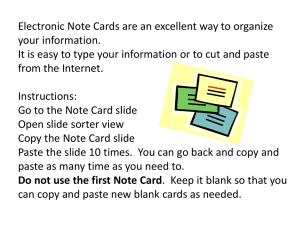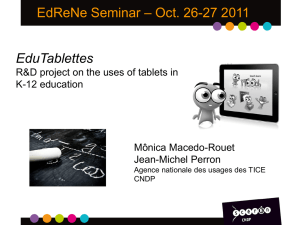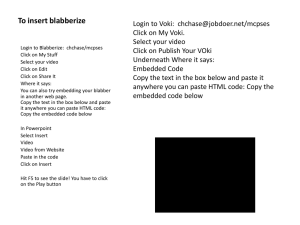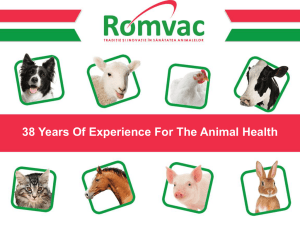Common Equine Medications and Their Effects
advertisement
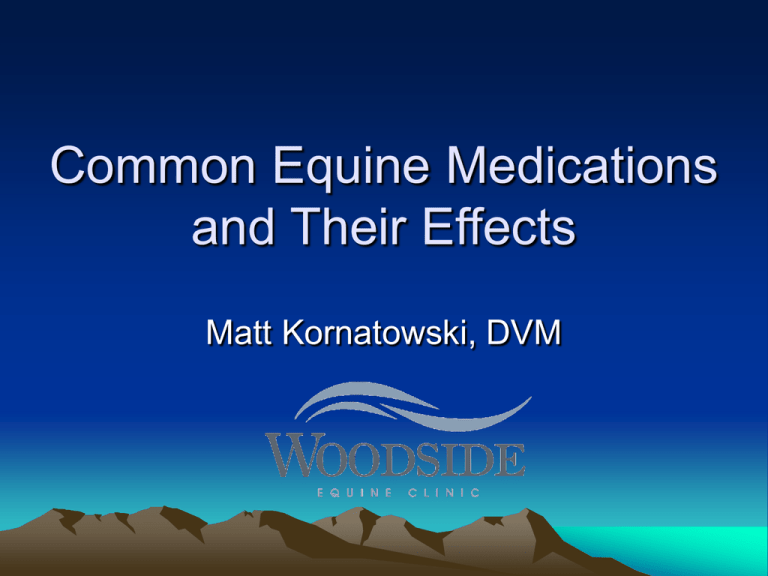
Common Equine Medications and Their Effects Matt Kornatowski, DVM My Perspective • Many questions about drugs • Misconceptions • Reasons for choosing certain drugs • Safety for you and your horse Outline • Sedatives • NSAIDs (Non-steroidal Antiinflammatories) • Antibiotics • Gastroprotectants • Topicals • Miscellaneous Talking Points • • • • Appearance Uses Administration routes Side Effects Non-Talking Points • Doses • Steroids (Too much) • Reproduction drugs – Dr. Stanford’s talks • Dewormers – A whole different talk! • Supplements • Controlled drugs Abbreviations • • • • PO = Per Os = Orally IV = Intravascularly IM = Intramuscularly PR = Per rectum = enough said Sedatives • • • • • Acepromazine Detomidine Romifidine Xylazine Use caution! Acepromazine (Ace) • Affects dopamine receptors • Light yellow appearance Oral tablets/paste • Used for mild calming effect – Not strong analgesic/sedative • Given PO, IM, IV • Lasts 3-4 hrs • Side effects: Sedation, ataxia, hypotension, – persistent penile prolapse (paraphimosis) Detomidine (Dormosedan, Dorm) • Alpha 2 agonist • Clear in appearance • Used for heavy sedation, mild analgesia – Dentals, wound repair, etc • Given IM, IV • Lasts 45 min – 1 hr • Side effects: Ataxia, swaying, diuresis – Occasional hyperresponsiveness – Rarely recumbency • Reversal agents Romifidine (Sedivet) • Alpha 2 agonist • Clear in appearance • Used for moderate sedation – Wound repairs, oral exams • Given IM, IV • Lasts 1 – 1 ½ hrs • Side effects: Ataxia, sweating – Rarely facial edema Xylazine (Rompun) • • • • • • Alpha 2 agonist Clear in color, shortest acting Used for mild sedation, mild analgesia Given IM, IV Lasts app. 30 min Effects: Sedation, mild analgesia – Occasional hyper-responsiveness NSAIDs (Non-Steroidal Anti-Inflammatories) • • • • • • Phenylbutazone Banamine Firocoxib Aspirin Piroxicam Meloxicam NSAIDs (Non-Steroidal Anti-Inflammatories) Phenylbutazone (Bute) • Large white tablets, white paste, flavored powder • Used for musculoskeletal pain – Mild anti-pyretic effect • Given PO, IV • Lasts 12-24 hrs • Side effects: GI ulceration (high dose) – Renal papillary necrosis (dehydration) – Bone marrow suppression (anemia) • Long term use – IM injections cause tissue necrosis (death) – Use caution in pregnant mares • “Bute Babies” Flunixin Meglumine (Banamine) • • • • • White paste, clear liquid Used for GI pain, fever reduction Given PO, IV, (IM??) Lasts 12 hrs Side effects: GI ulceration – Renal ischemia (papillary necrosis) AND…. Clostridial Myositis Result of IM injections Aspirin • White powder • Used for hypercoagulable states, Equine Recurrent Uveitis • Given PO • Side Effects: Same as above (less common), platelet inhibition, tinnitus (overdose) Firocoxib (Equioxx, Previcox) • • • • • Cox 2 specific Used for musculoskeletal pain Given PO Lasts 24 hrs Side effects: Less common but similar to other NSAIDS – GI ulceration, renal injury, oral erosions Piroxicam • • • • Cox 1 Used for Squamous Cell Carcinoma Given PO, IV (less common) Side effects: Same as above Meloxicam (Metacam) • Cox 2 specific, considered quite safe • Used in Europe • Coming soon?? Antibiotics • • • • • • • • SMZs Penicillin G Gentamicin Ceftiofur Doxycycline Metronidazole Enrofloxacin Chloramphenicol Resistance • When a microorganism has the ability of withstanding the effects of antibiotics – Genetic mutation within the bacteria • Due to overuse or improper use – underdosing • Multi-drug resistant superbugs – MRSA (Methicillin Resistant Staph. Aureus) SMZs • Trimethaprim Sulfadiazine (Veterinary) – SMZs, Uniprim, Tucoprim • Trimethoprim Sulfamethoxazole (Human) – Tribrissen • 160 mg Trimethoprim • 800 mg Sulfa • Main difference: – Urine concentration – Metabolization SMZs • Paste, powder, white tablets • Given PO, IV (Rare) • Used for variety of infections – Mainly skin, uterine, urinary • Side effects: Colitis, Anemia (long term) Penicillin G • • • • “G” = Gold Standard White liquid Limited spectrum of activity Used commonly for Staphylococcus/Streptococcus - Skin, “strangles” • Given IM only! – Other forms of penicillin can be given IV • Side effects: Soft tissue reaction, Allergic reaction, anemia (long term use) Gentamicin (Gentocin) • Clear liquid, ophthalmic ointment • Synergistic with penicillin – Gentomicin is poor against Streptococcus • Given IV, IM, Ocular • Side effects: Nephrotoxic (Kidneys) – Rare ototoxicity (ears) – Neurotoxicity Ceftiofur (Naxcel, Excede) • White powder reconstituted to yellow liquid • Excede is brown, thick liquid • Used for respiratory infections, internal disease, surgery • Given IV, IM (Excede IM ONLY) • Side effects: Colitis & anemia (high doses) Doxycycline • Small, orange tablets • Used for various issues – Penetrates tissues very well • Given PO – Oxytetracycline given IV • Side effects: Congenital malformations • GI disruption • Relatively safe Metronidazole (Flagyl) • Oblong white tablets • Used for diarrhea, thrush, canker (anaerobic infections) • Given PO, PR, topically • Side effects: – Neurotoxicity (rare) – Disruption of GI protozoa Enrofloxacin (Baytril) • Liquid or oral paste • Used for variety of infections – Less resistance • Given PO, IV • Side effects: Colitis Neurotoxicity Tissue irritation (Oral lesions) Cartilage damage in young Chloramphenicol • Yellow pills, oral liquid, eye ointment • Used for variety of infections – “Big gun” antibiotic • Given PO, IV, Ocular • Side effects: Diarrhea, inappetance bone marrow suppression Relatively safe • Aplastic anemia in humans – Wear gloves! Gastroprotectants • Gastrogard • Ulcergard • Ranitidine Omeprazole (Gastrogard/Ulcergard) • Oral, white paste • Treat/prevent gastric ulcers • Proton pump inhibitor – Decreases acid secretion • Given PO • Side Effects: – No adverse effects listed Ranitidine (Zantac) • Small, circular yellow or white tablets • Treat gastric ulcers • Inhibits H2 receptors – Decreases acid secretion • Given PO, IV • Side effects: Very rare Topicals • • • • • Triple Antibiotic Ointment Silver Sulfadiazine Furazone Surpass DMSO Triple Antibiotic Ointment (Neomycin, Polymyxin, Bacitracin) • Clear gel comprised of 3 antibiotics • Topical antibiotic • Used for variety of issues – Eye ulcers (Ophthalmic), wounds, mild to moderate skin infections • Side effects: Contact dermatitis Silver Sulfadiazine (SSD) • Thick, white cream • Anti-bacterial, anti-fungal • Used for burns, eye ulcers, wounds • Side Effects: Skin irritation Nitrofurazone (Furazone) • Yellow gel – Can be mixed with DMSO • Antibacterial • Good for burns, skin infections – Scratches • Side effects: – Contact dermatitis – Renal impairment Diclofenac (Surpass) • • • • White gel Topical NSAID (Non-specific Cox 1 & 2) Control of joint pain & inflammation Side effects: – Well tolerated – Dermatitis (Let dry) – Possible weight loss, gastric ulcers, diarrhea DMSO (Di-Methyl Sulf-Oxide) • Clear gel • “Topical application to reduce acute swelling due to trauma” – Used in many other ways • Topical carrier agent – Some anti-inflammatory properties • Side effects: “Burning” (erythema) – Garlic odor – Relatively safe – Teratogenic properties in humans (Gloves!) Miscellaneus Meds • Pergolide • Isoxsuprine • Marquis Pergolide • Dopamine agonist – Decreases release of certain proteins • Used to treat Cushing’s Disease • Side effects: Few (Well tolerated) – In humans: Neuroses (hallucinations), nausea, vomiting, rhinitis Isoxsuprine • White tablets • Used for laminitis & navicular – Dilates blood vessels – Questionable efficacy • Given PO • Side effects: Unlikely – Tachycardia, hypotension – Hyperexcitability Ponazuril (Marquis) • Paste formulation • EPM treatment ONLY – Equine Protozoal Myelitis – Anti-protozoal – Affects organelle specific to protozoa! • Given PO • Side effects: – At 10x the dose, some soft manure – Very safe! Key Points • Sedatives – Ataxia, sweating, urination • NSAIDs – Gastric ulcers, kidney problems • Antibiotics – Resistance – Potentially cause colitis • Call your vet before administering any drugs! Questions?
